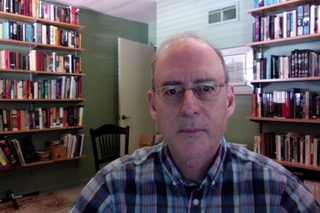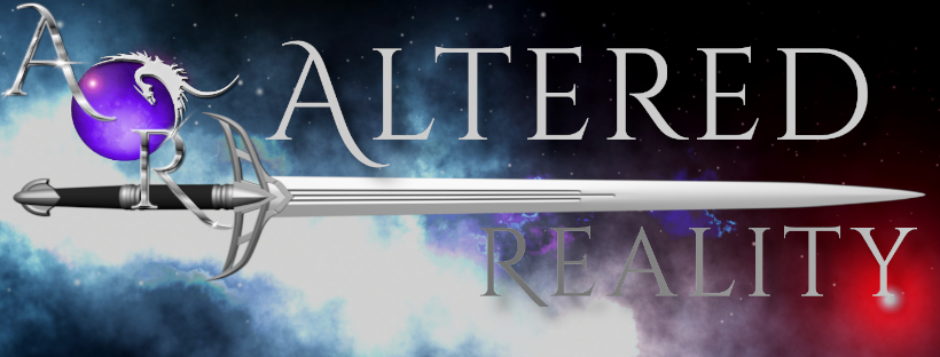My mother speaks to me in different ways—through the songs of birds, out of clouds, from my reflection in mirrors or in pools of water. Sometimes, I have Adeline dreams. That’s her name—Adeline, as it is mine. But in all those dreams, I’ve never seen her face, although she assures me that we could be twin sisters. We have always lived apart, always, and when I ask her why she has chosen to remain, throughout my life, so far from her only child, she will say, with her penchant for vague mystery, that if the conditions of our lives were not so radically different, we would be as mother and daughter. This I must accept as her final word on the subject, because these fleeting contacts with her are everything to me.
…
For many hours, the man had been ascending a dusty, gradually steepening path that switch-backed through mountainous scrub country, and the late afternoon sun was in his eyes when he spotted the first sign of human habitation in the form of a railed porch halfway up a low but daunting rock face, sheltering the door of a massive stone house seemingly carved out of the mountain itself. The walls were rough and unfinished, so like the rock face as to suggest camouflage, and had it not been for the porch he might have overlooked it. Between the need for food and water and an odd reluctance to breach the coldly preoccupied air of this fortress-like house, he had to decide whether to climb the low cliff or keep ascending around the next bend to what he hoped was a more accessible front entrance.
He heard a wheezing pant behind him, and turned to face the only living creature, besides vultures, that he’d seen all day: a big, gray-muzzled hyena. Its head and shoulders enormous, its back legs scrawny and barely half the length of its powerful front legs, it appeared to be climbing an even steeper grade than the path as it started toward him with a coughing snarl. He scrambled up the low cliff, sending loose pebbles onto the hyena, which was showing an unexpected facility at climbing.
Halting just beneath the cantilevered floor of the porch, he dislodged a fist-sized rock and threw it as hard as his precarious perch would allow, hitting the animal squarely on the shoulder. It yelped but kept coming. With only a yard or so between his feet and those bone-eating jaws, he half-climbed, half-leapt over the steel railing onto the porch. Finding the door locked, he pounded and shouted for help. So far, the railing deterred the animal, since there were no level rocks within several feet of the base of the porch, and even if there had been, it couldn’t have jumped the rail or squeezed its massive shoulders through the small space between the railing and the floor. But its famished desperation was palpable, and although it soon gave up and descended the cliff, he knew it would lie in wait below until thirst and starvation drove him back to the road. There was no other way off this porch except down, and he could feel the old despair creeping back, when the door opened.
A slender, petite woman with straight black hair motioned him inside, then closed and locked the heavy door. The cool, poorly lit interior of the house was a confusing blend of natural rock formations and ugly metal furniture.
“I was wondering when you’d make up your mind to come back,” the woman said, her low voice and young-old face naggingly familiar.
Trying not to sound mystified, he said, “There isn’t much out there besides heat and dust. And a very hungry hyena.”
“Every runaway’s story,” she said with a quick smile, pointing to a steel mesh recliner chair that looked more medical than restful. “Please. You must be tired.”
“And hungry, and thirsty, and very glad you answered the door.”
“You should have tried the front door. It has a bell.”
“I wouldn’t have made it that far.”
Her friendly expression faded into a blank stare, as if she were picturing him failing to escape the hyena’s jaws. “What matters is, you’re here,” she said. “I’ll bring water.”
“Thank you, Miss.…?”
“Adeline. Stimson. What’s yours?”
“I…” he began, then shook his head and was silent.
“It’s Adrian,” she said softly. “Adrian Also.”
“‘Adrian Also,'” he repeated, trying it on the tongue. “How is it that you know my name and I don’t?”
“I’ll explain over dinner. For now, please rest.”
Faint music wafted from another part of the house. He sat, or rather, lay in the chair, which enfolded him in its soft, flexible mesh like a silk cocoon. It wasn’t uncomfortable, but he soon found that he couldn’t get back up, and after a couple of tentative tries, decided to save face and wait for his hostess. She reappeared several minutes later, placing on a low stone table a single cup and a clay pitcher of water.
“Just grip the frame on both sides and squeeze,” she said, her quietly controlled voice now conveying an authority that made him realize—as she’d probably meant it to—that she was the master of this house.
He did as she instructed and felt the mesh stiffening under his back, slowly pushing him to a sitting position. He stood up and faced her. Something in her probing gaze suggested a mother’s concern, although she kept her distance.
“Your face is familiar,” he said. “But I don’t recall meeting you.”
“We’ll discuss it over dinner.” She poured him a glass of water, which he quickly drained, and then refilled it. “Drink slowly, Adrian.”
“I’m sorry I forgot your name, Adeline. And even sorrier that I forgot my own.”
“It’s all right. Names groove less deeply on the cortex than faces. Your face in particular…” she said, her voice trailing off. Then, more brightly: “We can eat now, if you’re ready.”
He followed her into a low-ceilinged room without windows, softly lit by what appeared to be a glass-enclosed hive of luminous bees. A platter of cheese, fruits and bread and a clay pitcher of wine lay between two places set at a marble table. Though ravenous, he tried to eat as slowly as she did, while she questioned him about his journey. He told her that in all his travels, the only creature he’d seen besides vultures was the hyena.
“There are small, nocturnal animals living in the rocks,” she said. “He must hunt them, because I don’t feed him, and he’s been out there for years.”
“Deterring visitors?” he asked with a smile.
“If I had any. I don’t count you. This is a homecoming.”
“Home? How long was I gone?”
“Aren’t you more curious to know why you even need to ask the question?”
“All right. Why don’t I remember when, or even why I left?”
“Your amnesia is situational, not traumatic. Nothing to worry about.” She refilled their glasses.
“Tell me something, Adeline,” he said between sips of wine. “Do you enjoy being cryptic?”
She smiled. “I suppose I do, a little. In solitude, I’ve found, one’s pleasures tend to narrow and deform over time. In my insufferably precocious youth, mystifying people was how I hid my shame at being different, a so-called prodigy. I have no such excuse now.”
“You don’t need an excuse for being brilliant,” he said.
“Thank you. But my brief bout of genius ended with puberty. Now I just have good work habits.”
“And what is your work, if I may ask?”
“Genetics.”
“Pure or applied?”
Her eyes briefly narrowed. “Both.”
They ate in companionable silence while he stole glances at the pleasant mystery of her face.
“More bread?” she asked.
“It’s delicious, but no, thanks.”
“Then if you’ve eaten and rested enough, I’d like to show you something.”
He followed her down a narrow stone corridor poorly lit by the same luminous hive insects, until it opened into a cavernous library filled to an almost oppressive degree with books. In the center of the room was a large aquarium mounted on a marble pedestal. She asked him to closely observe what appeared to be its single inhabitant, a tentacled cephalopod whose body was protected by a lovely shell patterned into a closed, perfect curl. It swam by, expelling jets of water, moving backwards with the stately dignity of a creature safe from its natural enemies.
He noticed a pulsing, translucent pouch underneath the mass of flowing tentacles that he first took to be an egg sac, out of which, without warning, darted a tiny woman no more than two inches tall. Her hair, the same color as her skin, was a blondish orange, and seemed to adhere in a single mass, functioning like a dorsal fin. He could see gills pulsing at the sides of her neck, and her fingers and toes were webbed. He leaned close to the glass to get a better look, which startled her, and almost quicker than he could follow, she darted back into the pouch. There were several rocks stacked around one corner of the aquarium, and the creature moved toward them, then slowly descended into its single hiding place. While it was resting on the bottom, he knelt down for a closer look. He noticed a small aperture in the shell itself, through which he could just make out the fearful, curious eye of the mermaid. She had allowed him only a glimpse of her face, but it was enough.
“What did you see?” asked Adeline.
“She looks like you,” he replied. “With gills.”
“Our DNA was identical before I designed her to be an aquatic symbiont of a chambered nautilus. Which I also designed.”
“And the hyena?” he asked, strangely afraid to hear the answer.
“I have many regrets,” she replied. “That poor, unmated creature out there is one of them. It scratches on the front door sometimes, like a dog.”
“But you don’t let it in.”
She shook her head and looked away.
He took her by the shoulders. “And what am I? Another regret?”
She gently disengaged herself. “My only excuse for you was loneliness. An excuse that the law doesn’t recognize.”
“Law? What law?” The dizziness and nausea had taken him quite suddenly. He backed away from her, half-falling into a chair. Was it just shock at what she’d revealed? Sweat poured out of him, his breathing labored.
She stood over him. “The law against kelling, our term for life-sized cloning. Only miniatures are permitted, homuncules, we call them, with a maximum six-month lifespan, and they must live out their lives in a sealed environment. My mermaid is an exception. Most are air-breathers, inhabiting a self-contained ecosystem called a Homuncularium. My late husband and I designed and built the one in my lab.”
His vision dimmed. He was barely able to focus on her. “What’s wrong with me?”
“I’m so sorry, Adrian. When my Adrian died five years ago, I fell apart. I became obsessed with observing his homuncule and mine, living out their quick little lives. I cloned generation after generation, at first obeying the strict laws of non-interference in the lives of homuncules. I used high-mounted cameras to watch them through all the stages of youth, maturity, old age, and death, believing that I could somehow perfect my own life by avoiding the mistakes they kept making. By then, I was more voyeur than scientist. I even began communicating, using implanted microphones, with my most recent generation of Adeline, if always carefully and obliquely, to preserve her autonomy. ‘Burning bush moments,’ I called them.
“Nothing helped. So I harvested more of Adrian’s DNA that I’d stored after his death and kelled you, trying to fool myself into believing that… But of course you aren’t him; you’re you. Then, three weeks ago, you left, too soon after you’d awakened as a grown man for more than faint traces of this place and me, to harden into long-term memories. I was terrified that you’d be spotted and identified and sick at what I’d done. When you came back—”
“You poisoned me.” Too late, he recalled that she hadn’t eaten any bread.
“You’ll live again, Adrian, I promise. This won’t even be a dream you forgot. It won’t be anything.”
“It was something,” he gasped. “My life.”
“I’m sorry.” But she was talking to a corpse.
…
Last evening, after a hard day’s work tilling my small vegetable garden, I was resting on a bench near my hut, when I heard my mother’s voice echoing from the depths of the well, speaking slowly and softly as she always does, so as not to frighten me: “You will have a companion soon, Adeline. A good man with whom you can share your life. Be ready for him.” I gave thanks and waited. The next day, I heard a soft knock at the front door and tried to keep myself from running to answer it. I opened the door, and a tall, handsome young man stood there.
“My name is Adrian Also,” he said, smiling nervously. He looked tired and thirsty as if he’d been wandering in the heat for many hours.
“Mine is Adeline,” I said. “Please come in.”
In her own way, my mother has always looked after me.
About the Author
 Jeffrey Greene was born in Michigan, raised in Florida, and currently lives in Bethesda, Maryland. He has been writing and publishing short stories and the occasional novella since the 1980s. Some of the publications in which his stories have appeared are the North American Review, Tomorrow Speculative Fiction, Oasis, Reactor Magazine, Potomac Review, decomP Magazine, Zahir Speculative Fiction, and most recently, Bewildering Stories.
Jeffrey Greene was born in Michigan, raised in Florida, and currently lives in Bethesda, Maryland. He has been writing and publishing short stories and the occasional novella since the 1980s. Some of the publications in which his stories have appeared are the North American Review, Tomorrow Speculative Fiction, Oasis, Reactor Magazine, Potomac Review, decomP Magazine, Zahir Speculative Fiction, and most recently, Bewildering Stories.
His short story, “The Blind Gambler,” was included in the anthology,“100% Pure Florida Fiction,” in 2000, published by the University of Florida. He has self-published two collections of short stories: Stories From the Cold Room, and The Iron Desert and Other Stories.
![]()






